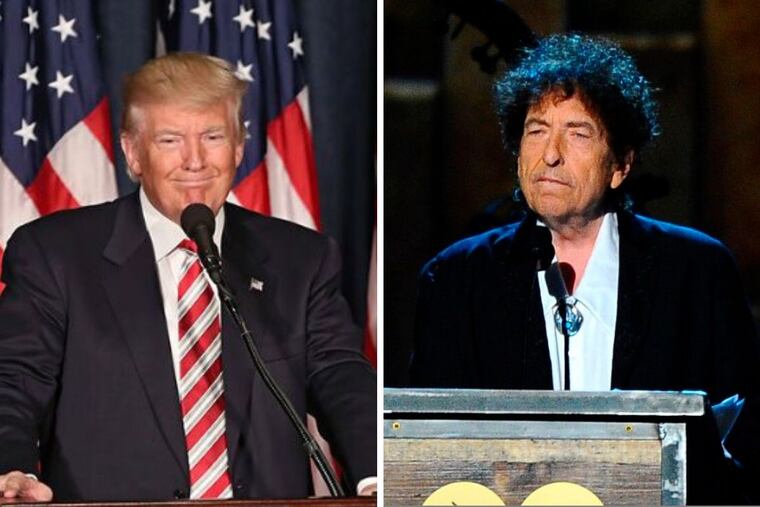Bob Dylan would understand Trump foreign policy in 2019 | Trudy Rubin
Something is happening to America's global clout and reputation but the White House and the GOP don't know what it is.

As I looked back at key foreign-policy events of 2019, a line from Bob Dylan’s “Ballad of a Thin Man” popped into my head: “Something is happening and you don’t know what it is, do you, Mr. Jones?”
Back in the day, there was much debate over whom Dylan had in mind. But “Mr. Jones” soon came to symbolize folks who remained oblivious to the seismic cultural shifts of the 1960s.
So who is the Mr. Jones of 2019? In one sense, “Mr. Jones” could be all of us, as an endless stream of foreign-policy crises speeds by so fast that the pattern is often blurry.
But America’s retreat from global leadership has accelerated so rapidly this year that it has set off a scramble to fill the vacuum. And the man with his foot on the gas appears oblivious to the danger.
“Something is happening and you don’t know what it is, do you, Mr. Trump?” is an apt mantra for foreign policy in 2019. Here are some of this year’s key foreign-policy developments that have solidified the global image of America in retreat.
Most important, 2019 was the year that China’s global ambitions came fully out of the closet.
» READ MORE: Talk of a new Cold War with China is misleading I Trudy Rubin
With its military buildup and growing economic clout, Beijing made clear its intent to challenge America’s positions and alliances in East Asia (including on Taiwan). Also, in the Indo-Pacific region and beyond.
Instead of firming up long-standing U.S. alliances with Japan, South Korea, and Southeast Asian nations, Donald Trump continued to pick fights and insult their leaders in 2019. Even in Taiwan, as I learned on a recent visit to the region, there is growing worry about Trump’s reliability.
In 2019, China presented itself as the global go-to nation the way the United States did in the post-World War II era. As I was told repeatedly in Beijing, Chinese leaders have observed Trump’s lack of interest in alliances and international organizations and are presenting themselves as an alternative. The Chinese are taking key roles at the United Nations, including in specialized agencies that set global standards in important areas such as communications networks and technology.
And Beijing is wooing nations in Southeast Asia, Africa, South America, the Indian subcontinent, and the Pacific Islands with huge cash loans for infrastructure. Those loans guarantee China immense political say on matters of concern to Washington, from key U.N. votes, to international support for Taiwan, to control of shipping lanes in the South China Sea, and more.
In 2019, a self-confident Xi Jinping bested Trump in the only arena of U.S.-Chinese relations where the president seems fully engaged — trade policy. After two years of tariffs produced no results, Trump finally accepted a mini-deal — details not finalized — with an eye to 2020 elections. But it appears to offer nothing more than he could have had in 2017. No structural changes to China’s unfair trade policies.
In 2019, Xi recognized Trump’s greatest weakness — he has no broader foreign-policy strategy beyond serving his whims or personal needs. Other autocrats took note.
» READ MORE: Trump demolishes machinery of diplomacy when America needs it most I Trudy Rubin
In 2019, Trump’s chum Kim Jong Un steadfastly refused to denuclearize, continuing to expand his nuclear arsenal. Trump continued to praise him, unwilling to admit his policy had failed.
In 2019, Iran’s ayatollahs learned they could down an armed U.S. drone and have proxies destroy a key Saudi refinery without U.S. retaliation. Recognizing America’s fade, Gulf allies began to think about patching up differences with Tehran. Even Israel is unnerved.
In 2019, Trump demonstrated with one phone call America’s indifference to key allies, when he abandoned the Syrian Kurds to the mercies of Turkish autocrat Recep Tayyip Erdogan. Other allies got the message.
In 2019, the Ukraine scandal revealed that Vladimir Putin could plant conspiracy theories in Trump’s brain, convincing him that Ukraine, not Russia, hacked the 2016 elections. China, Iran, and the world witnessed his gullibility.
The 2019 upshot: Allies and adversaries increasingly discount U.S. leadership, convinced that Trump is mercurial, unreliable, and ill-informed (and bereft of advisers who will contradict him).
This turns the postwar world on its head. China and Russia veto U.S. resolutions at the United Nations and hold military drills with Iran. Russia works hard, unimpeded, to undermine the European Union and NATO (helped by Trump’s disdain for both organizations). Pyongyang builds more bombs. American remains wealthy but disrespected.
The world waits gingerly to see who will win in 2020 and whether America’s clout can be resurrected. Yet the president has no clue. Do you, Mr. Trump?